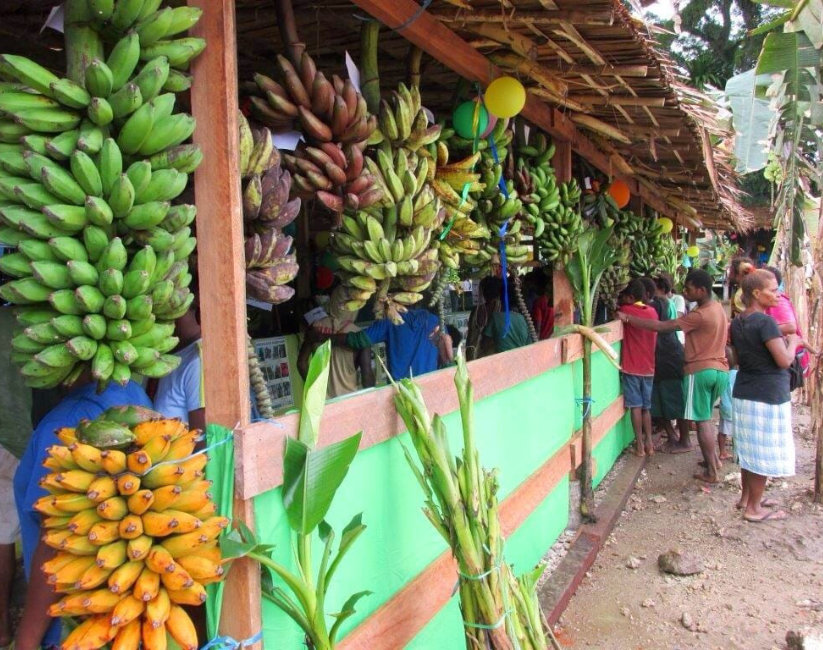Story by Russ Grayson, July 2014.
Photos: Kastom Gaden Association and Russ Grayson
A festival of bananas in the Solomon Islands
In the Solomon Islands, traditional farming plus innovation ensures the security of the food supply…
LYING SOUTH-EAST OF GUADALCANAL at 10°36’S and 161°45’E between the Solomon Islands and Vanuatu, and north-east across the Coral Sea from Queensland, Australia, the island of Makira forms one of the Solomons archipelago.
It is an island far from the well-travelled Pacific tourism routes, a place where cultural tradition is still strong and where the links between people and their food are short and direct. Much of what they eat, they catch or grow.
A diversity of tasty bananas… a staple food of the tropics…
Makira’s tropical maritime climate enables a diversity of tropical crops to be produced, including a crop that is a staple food in a number of tropical countries — bananas.
The Makira banana collection…
The Solomon Island development agency, the Kastom Garden Association (KGA) — Solomon Island Pijin for ‘customary gardening association’ — has for some time been involved in developing a collection of banana varieties on Makira.
The idea of the collection — think of it as a banana bank — is that Makira farmers can obtain traditional varieties new to them and can also contribute their own banana varieties to the collection so that others can benefit.
The collection’s purpose is to distribute varieties over a wider geographic area, ensuring they remain available as replacements after loss to cyclones or other events, and to broaden the nutritional availability of the plants.
According to the KGA’s Rouhana Moses, over 40 varities are maintained in the Makira banana collection.
A fruity festival of a tasty, nutritious crop…
Writing on the KGA’s website, Rouhana describes the recent Makira Banana Festival…
“Kastom Gaden Association (KGA) has successfully participated in showcasing more than 40 varieties of banana during the recent Makira Banana Festival in Makira Province”, he writes.
“The banana festival was part of the tourism promotion aimed at attracting visitors to Makira and to see the culture they have with this popular food crop, as it is part of their stable diet.
“In one of the recent private collections, a total 82 varieties of banana have been collected and planted. KGA, in collaboration with the Ministry of Agriculture and Livestock, have collected more than 40 varieties of banana and labelled them in the local language.”
The KGA set up a successful stall at the Makira Banana Festival.
“Visitors to the KGA stall appreciated the effort made to collect these banana varieties”, said Rouhana.
“The message of the stall was to encourage people to grow more banana as it is one of the food crops that can withstand climate change and support food security. In addition, we let the people know that bananas in Makira have recorded high amounts of carotene content —(Toraka spp) — among the highest in the world — which support healthy growth, so it is better to eat more banana to grow healthy.”
Banana products on display at the KGA stall included banana chips produced in Makira and medicine derived from banana to cure various sickness and diseases.
There were talks throughout the three days of the festival on emerging issues such as climate change, food security and nutritional health.
As well as for food, bananas are grown for fibre that is used for a number of purposes. In the Solomons as elsewhere, a distinction is made between those banana varieties eaten raw and cooking bananas, known as ‘plantains’ in some places.
The place of origin — what’s known as the ‘centre of diversity’ — of bananas is placed in Papua New Guinea (PNG) where the fruit has been cultivated in some places from something like 8000 years. PNG is considered to be one of the birthplaces of agriculture.
It is likely that a second centre of banana diversity developed in South East Asia at a later time.
The banana — one of humankind’s most useful of crops…
AUTHOR’S NOTE:
The author worked with the Australian NGO, APACE (Appropriate Technology for Community and Environment) as project manager and development educator:
- on food security projects in the Solomon Islands
- with a metals recycling/small business development project in Papua New Guinea.
Later, he joined with others to set up the consultancy, TerraCircle Inc, to continue the work started by APACE in the Solomons and elsewhere in the South West Pacific. TerraCircle continues to have a positive and ongoing association with Kastom Garden Association.

